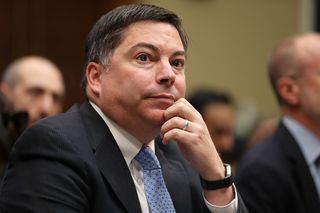Pandemic Colors View of Broadband Deployment
Broadband deployment is still a work in progress, but it’s progressing at a pace that does not require regulatory intervention to speed it up.
That is what the Federal Communications Commission is signaling, but not without some caveats from the Republican majority, amplified by the COVID-19 spotlight on the need for universal broadband ASAP.
It is a conclusion being challenged by critics of the pace of broadband deployment, who argue that old definitions of reasonable deployment should not hold in the new normal of a pandemic.

As has been the case with such reports under chairman Ajit Pai, the FCC’s just-
released report on whether or not broadband is being deployed to all Americans on a reasonable and timely basis concluded that is indeed still the case.
That determination comes as Congress is pumping money into telehealth and the FCC is temporarily deregulating broadband subsidy programs to get and keep as many people online during the COVID-19 outbreak as possible.
Pandemic as Prism
As with everything else in the country and the world, deployment is now seen through the lens of a pandemic, which magnifies the longstanding issues with the quality, or lack thereof, of FCC data collection on broadband availability, a lens with a view that depends on who is looking through it. Activist groups find virtually anything short of universal service a failure, while the FCC’s Republican majority and industry see the glass as mostly full, thanks to billions of dollars in investment from both the private sector and government money.
Multichannel Newsletter
The smarter way to stay on top of the multichannel video marketplace. Sign up below.
Congressional Democrats, who tend to look at the empty part of the glass, are calling for billions of dollars in the next COVID-19 stimulus package to make sure that everyone gets connected to broadband. One thing the pandemic has done is show that Congress is willing to put large amounts of money into coronavirus aid.
Even on the Republican side, though, the pandemic appears to have added a note of urgency to getting the rest of the glass filled.
Commissioner Michael O’Rielly said
the pandemic brings heightened attention to the issue, though he said that, even in a crisis, the FCC can only do what is within its congressional authority. The goal of getting broadband to every American is the FCC’s highest priority, he said on a podcast last week.
O’Rielly conceded too many people still don’t have broadband at sufficient speeds and that the numbers were greater than the FCC was reporting due to problems with its data collection. He called that data “debatable” and “problematic.”
O’Rielly said even those numbers show that 8.3 million Americans don’t even have speeds of 10 Megabits per second and 1 Mbps upstream today, which is the FCC’s former high-speed definition, now effectively raised to 25/3. At that speed, he said, “we’re talking 18 million,” calling it a “really huge population.”
Then, he said, they have to acknowledge that those numbers “are actually higher than that.”
In his statement for the Section 706 report, O’Rielly said the “reasonable and timely” finding “does not suggest that we have succeeded in our mission to bring broadband access to all Americans.”
But under Pai, the FCC’s focus has been on the process, not a destination, at least when it comes to the report. That is important because if the report concludes broadband is not being deployed in a reasonable and timely fashion, the FCC is empowered to regulate to make sure that happens, including potentially rate regulation, the third rail for internet access providers.
The FCC under recent Democratic chairs had consistently concluded that, without universal access, the deployment was not reasonable and timely, which Pai, when he was in a minority, pushed back on strongly and changed when he got the chairmanship.
Dem Pushback
Current FCC Democrats continue that tradition, again with the COVID-19 pandemic for an exclamation point. “This report is baffling,” Democratic commissioner Jessica Rosenworcel said. “We are in the middle of a pandemic. So much of modern life has migrated online. As a result, it has become painfully clear there are too many people in the United States who lack access to broadband. In fact, if this crisis has revealed anything, it is the hard truth that the digital divide is very real and very big. But you’ll find no evidence acknowledging that in today’s [report].”
The FCC again said it would not factor in price and affordability in the equation of deployment, an omission Rosenworcel said makes the entire report “suspect.” (The other Democrat on the five-member panel is Geoffrey Starks.)
The Open Technology Institute, whose backers include technology companies, hammered the report as “out of touch” with the COVID-19 reality.
It said that the FCC’s idea of what reasonable deployment needs to change given how crucial that deployment now is.
Joshua Stager, senior counsel at New America’s Open Technology Institute, said in the time of the novel coronavirus, continuing to maintain that the current pace of deployment is reasonable and timely “strains credulity,” particularly given that it is based on faulty data. But he goes even farther, saying the conclusions undermine the fight against the virus. The stay-at-home defense strategy presumes people can bridge the social distancing via broadband connections.
The FCC has failed to understand that the pandemic “has understandably raised the bar for what reasonable broadband looks like,” Stager said.
Contributing editor John Eggerton has been an editor and/or writer on media regulation, legislation and policy for over four decades, including covering the FCC, FTC, Congress, the major media trade associations, and the federal courts. In addition to Multichannel News and Broadcasting + Cable, his work has appeared in Radio World, TV Technology, TV Fax, This Week in Consumer Electronics, Variety and the Encyclopedia Britannica.

